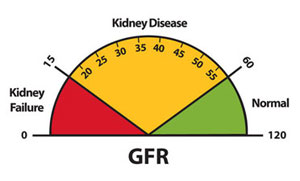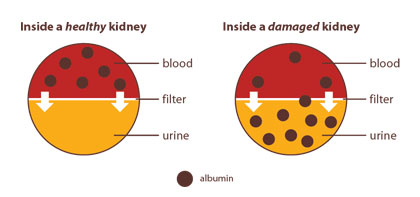Learn About Kidney Disease
Home | Kidney Disease Benefits | Learn About Kidney Disease | VHA Dialysis Facilities | eKidney Clinic | VA Kidney Health YouTube
Kidneys and Kidney Disease
Your kidneys filter extra water and wastes out of your blood to make urine. Kidney disease means that the kidneys are damaged and can't filter blood like they should. This damage can cause wastes to build up in the body. For most people, kidney damage occurs slowly over many years, often due to diabetes or high blood pressure. This is called chronic kidney disease. When someone has a sudden loss in kidney function because of illness, injury, or taking certain medications this is called acute kidney injury. Acute kidney injury can occur in a person with normal kidneys or in someone who already has kidney problems.
The National Chronic Kidney Disease Fact Sheet can be found on the *Centers for Disease Control and Prevention (CDC) website.
Kidney Disease Risk Factors
Diabetes and high blood pressure are the leading causes of kidney disease. Other factors include heart and blood vessel disease and family history of kidney failure. Additionally, African Americans, Hispanics, and American Indians are at high risk for developing kidney failure.
Protecting Your Kidneys
It's important that you manage your overall health when you have kidney disease or are at risk for kidney disease. The VA's National Center for Health Promotion and Disease Prevention offers healthy living advice which can help you to protect your kidneys and keep kidney disease from getting worse by slowing diabetes and high blood pressure.
Symptoms
Many people with kidney disease don't have symptoms until their kidney damage is very advanced. For most people, blood and urine tests are the only way to know if you have kidney disease. Enrolled Veterans who have diabetes, high blood pressure, heart disease, or a close family member with kidney disease may want to talk with their Local VA Healthcare Provider about getting tested today.
Testing for Kidney Disease
 Two tests are needed to check for kidney disease.
Two tests are needed to check for kidney disease.
A blood test checks your GFR, which tells how well your kidneys are filtering. GFR stands for glomerular (glow-MAIR-you-lure) filtration rate.
- A GFR of 60 or higher is in the normal range.
- A GFR below 60 may mean kidney disease.
- A GFR of 15 or lower may mean kidney failure.
A urine test checks for albumin in your urine. Albumin is a protein that can pass into the urine when the kidneys are damaged. Albumin is a protein found in the blood. A healthy kidney does not let albumin pass into the urine. A damaged kidney lets some albumin pass into the urine. The less albumin in your urine, the better.
- A urine albumin result below 30 is normal.
- A urine albumin result above 30 may mean kidney disease.
Managing Kidney Disease
People with kidney disease can continue to live productive lives: working, enjoying friends and family, and staying physically active. You may need to make some changes to your diet and lifestyle to help you live a healthier and longer life.

Lifestyle
Lifestyle changes for early kidney disease include controlling blood pressure, managing blood sugar, if you smoke, are taking steps to quit, taking your medicines the way your doctor tells you, becoming more physically active, and losing weight if you are overweight. Learn more about physical activity, quitting smoking, and controlling diabetes from VA's MOVE! Program.
Nutrition
What you eat and drink may help slow down kidney disease. Some foods may be better for your kidneys than others. VA's Nutrition and Food Services offers nutritional information to Veterans.
Medication
People with kidney disease often take medicines to lower blood pressure, control blood glucose, and lower blood cholesterol. Two types of blood pressure medicines - ACE inhibitors and ARBs - may slow kidney disease and delay kidney failure, even in people who don't have high blood pressure.
Some medicines can also harm your kidneys. If you have kidney disease, you need to be careful about all the medicines you take. Because your kidneys do not filter fluids well, medicines can build up in your blood. Your pharmacist and health care provider need to know what medicines you take so they can give you advice on how to protect your kidneys. Medication safety information can be found on the VA's Pharmacy Benefits Management Services Page.
Treatment for Kidney Failure
Kidney disease can get worse over time, and may lead to kidney failure. Kidney failure means very advanced kidney damage with less than 15% normal function. The treatment options for kidney failure are dialysis, kidney transplant, or medical treatment without dialysis. Since the kidneys no longer work well enough to maintain health, the goal is to find a treatment that can replace kidney function and/or reduce your symptoms. Dialysis and kidney transplants are treatments not cures for kidney failure. There are two major types of dialysis, hemodialysis and peritoneal dialysis. Home hemodialysis versus in-center dialysis can be discussed with your provider at your Local VHA Dialysis Facility.
Additional Educational and Research Resources
VA Kidney Disease and Dialysis Services Fact Sheet (2020)
The National Chronic Kidney Disease Fact Sheet can be found on the *Centers for Disease Control and Prevention (CDC) website.
*Clinical Trials is a registry and results database of publicly and privately supported clinical studies of human participants.
*External links. By clicking on these links, you will leave the Department of Veterans Affairs Website. VA does not endorse and is not responsible for the content of the linked pages.



















